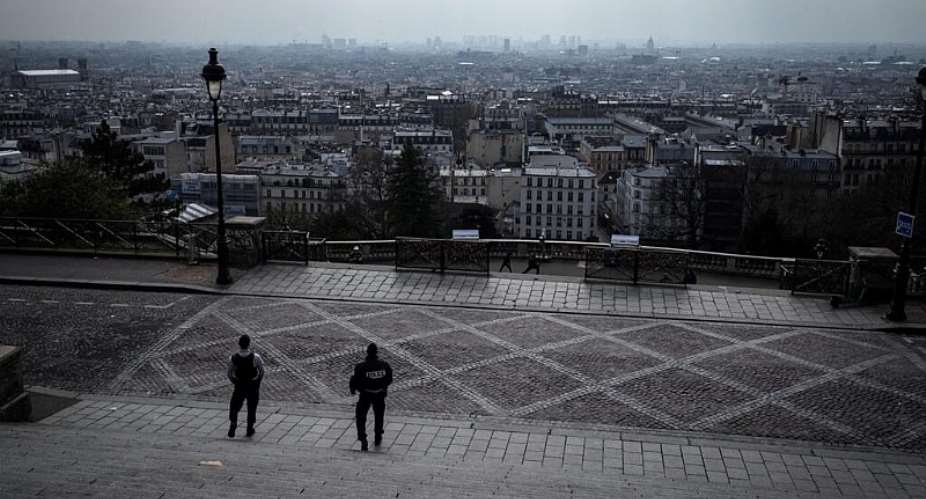In spring 2020, France shut down schools and businesses as the world faced a mysterious new illness – Covid-19. The first of three lockdowns was imposed – but why did people accept strict limits on movement in a country that is so used to protests and debates?
Starting 17 March 2020, people in France were not allowed outside for 55 days.
After shuttering schools, restaurants and other businesses, the French government imposed its first strict lockdown to contain the spread of Covid.
The population was required to present certificates whenever they left home. They were permitted a maximum of one hour outside for shopping or exercising, and only those working “essential” jobs could travel further than a kilometre.
And for the most part, people followed the rules.
Nicolas Moriot, a historian who has co-written a book about the lockdown, describes it as an “act of mass obedience”.
Listen to this story on the Spotlight on France podcast:
Based on a survey of 16,000 people, he found that 80 percent of people stuck to lockdown rules – not necessarily to avoid Covid, but because they were put off by the potential for run-ins with the police and a €135 fine for off-limits outings.
A quarter of those surveyed said they followed restrictions on movement but not health recommendations, like staying a metre apart and washing hands.
“So you cannot say their fear of the virus was very high,” Moriot concludes.
Lack of public debate
He compares France with northern European countries, which closed businesses but did not impose full lockdowns. France's reaction, he says, comes from its history of reacting to societal issues with security measures.
“You can say that it's a question of habit for the government to put in place things like certificates and restrictions on public freedom,” he said.
While debate in France emerged over health passes, vaccines and later lockdown measures, very few people protested initial restrictions in the spring of 2020 – which Mariot attributes to the fact that there was little opportunity to organise, or even exchange.
“Associations, unions and political parties were shut down, as well as social and athletic gatherings. All that was completely cancelled. And this is the way French people shape their political opposition,” he explains.
“As a result, individual citizens found themselves alone. We were in a direct relationship with the state, and I think that played a fundamental role in the fact that there was not much opposition.”
Worrying precedent?
Four years later, it is clear that lockdowns impacted mental health, notably for young people and students. Studies showed an increase in depression and anxiety during the first lockdown, growing with subsequent lockdowns and restrictions.
But there has been little reflection about lockdowns and their longer-term impacts on society, with relatively few questions about the measures themselves and the powers they gave to the state.
Police carried out 21 million checks during the first lockdown and issued 1.1 million fines.
Moriot is surprised that no one has questioned these penalties.
“What happened to them? Did people pay them? We know nothing,” he said.
In May 2023, the Spanish Supreme Court ruled that their Covid lockdown was unconstitutional and annulled the 1.2 million fines handed out.
Though France's constitutional court ruled on the vaccine passes used to access public venues later in the pandemic – judging that they were constitutional so long as it was temporary – they were never asked to pronounce on the lockdown and the fines.
French lawmakers questioned ministers in parliamentary committees, but focused more on mask availability than the lockdown itself.
“There was no public discussion or debate or questioning,” said Moriot. “It's surprising and quite worrying for the future.”
More on this story on the Spotlight on France podcast, episode 108.





 Let’s be true believers, not just church goers – Catholic Priest to Christians
Let’s be true believers, not just church goers – Catholic Priest to Christians
 Ejisu by-election: "We don’t need an independent candidate" — Akufo-Addo fights ...
Ejisu by-election: "We don’t need an independent candidate" — Akufo-Addo fights ...
 Election 2024: Bawumia dares Mahama to two-man debate as he starts countrywide t...
Election 2024: Bawumia dares Mahama to two-man debate as he starts countrywide t...
 'Borla' BVDs: 'Why would anyone want to buy 10 used biometric devices 'hard-code...
'Borla' BVDs: 'Why would anyone want to buy 10 used biometric devices 'hard-code...
 Professor Jane Naana pays last respect to Modestus Ahiable
Professor Jane Naana pays last respect to Modestus Ahiable
 IT is a major skill needed for the job market - Industry Players
IT is a major skill needed for the job market - Industry Players
 Nungua Traditional Council performs “Jenten Nishwamo” ahead of Homowo
Nungua Traditional Council performs “Jenten Nishwamo” ahead of Homowo
 Tema residents demand end of dumsor
Tema residents demand end of dumsor
 A vote for Owusu Aduomi is a vote gor NDC – Bawumia tells Ejisu residents
A vote for Owusu Aduomi is a vote gor NDC – Bawumia tells Ejisu residents
 S. Africa's ex-president Zuma makes surprise comeback
S. Africa's ex-president Zuma makes surprise comeback
